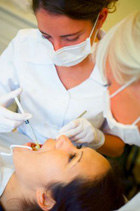 Losing one, some or all of your teeth can be a very traumatic experience. Whether it is due to disease, dental decay or just as the result of an accident, the toothless smile is never a good look for anyone of any age. There are also a number of health reasons besides the aesthetic that mean that missing teeth are bad.
Losing one, some or all of your teeth can be a very traumatic experience. Whether it is due to disease, dental decay or just as the result of an accident, the toothless smile is never a good look for anyone of any age. There are also a number of health reasons besides the aesthetic that mean that missing teeth are bad.
Even one missing tooth can cause further problems to occur with the other teeth. This is because the hollow left by teeth can act as a breeding ground for decay-causing bacteria which will attack the other teeth. The other remaining teeth will also be encouraged to move about in the mouth causing bite interruptions and sagging of facial tissue.
Luckily, there are a number of options available to replace missing teeth. Dental bridges and partial dentures are good for replacing one or two missing teeth and, of course, full dentures restore the appearance of a full set. But perhaps the most effective dental substitute is the dental implant. This is a small metal screw that is placed firmly into the jawbone to act as a base for the new dental crown. Implants can be used on their own to replace single of up to three missing teeth but they can also be used in larger numbers to act as a base for a full set of dentures.
These so-called mini-implants act as a stable clip to which you can attach your dentures so they are set firm in the mouth when you need them to be, but can also be removed at night or for cleaning purposes. Mini-implants or multiple implants remove the need for any messy or complicated denture adhesives and make it easier to eat the foods you want to eat. For more information about the possibilities of dental implants, make an appointment to see a Leeds dentist who can assess if you are a suitable candidate.





 Preventing dental treatment is a better way for your dentist to help you keep your teeth in good order, and that’s exactly what they do best says a Central Leeds dentist. If you take your dentists advice then you`ll prevent gum disease and save yourself a lot of money and time in the chair. It isn`t common sense for your dentist to keep working on repairing your teeth, this just restricts their time and prevents them from taking on more patients. A good hygiene format is what will prevent teeth problems, and your practice has an experienced and well trained hygiene nurse whose job it is to advise you. Brushing with a good toothbrush and the right one too, will also go some way to keeping gum disease away. Flossing and a good mouthwash will also help. Gum disease is caused by bad bacteria that feeds off the food residue that is left every time we put food into our mouths. The bacteria produces acid which then wears down the protective enamel. It also gets onto the gums and makes them sore and soft, this causes bleeding which then allows the bacteria to enter the blood stream and cause havoc. This is the main cause of premature tooth loss in most adults. This can all be avoided by a simple, but affective oral hygiene regime. Carrying a flossing stick will also help, as we all tend to eat a snack in between meals. This is just as damaging as a full meal, in fact it is more damaging at times as these snacks tend to be sugary, and that’s what attracts the bacteria more. At night the saliva gland will go sleep when you do, this stops acid being neutralised and damages your teeth quite quickly. Just a simple thing like having a glass of water by the bed, and sipping it through the night, will go a long way to helping you keep your teeth longer.
Preventing dental treatment is a better way for your dentist to help you keep your teeth in good order, and that’s exactly what they do best says a Central Leeds dentist. If you take your dentists advice then you`ll prevent gum disease and save yourself a lot of money and time in the chair. It isn`t common sense for your dentist to keep working on repairing your teeth, this just restricts their time and prevents them from taking on more patients. A good hygiene format is what will prevent teeth problems, and your practice has an experienced and well trained hygiene nurse whose job it is to advise you. Brushing with a good toothbrush and the right one too, will also go some way to keeping gum disease away. Flossing and a good mouthwash will also help. Gum disease is caused by bad bacteria that feeds off the food residue that is left every time we put food into our mouths. The bacteria produces acid which then wears down the protective enamel. It also gets onto the gums and makes them sore and soft, this causes bleeding which then allows the bacteria to enter the blood stream and cause havoc. This is the main cause of premature tooth loss in most adults. This can all be avoided by a simple, but affective oral hygiene regime. Carrying a flossing stick will also help, as we all tend to eat a snack in between meals. This is just as damaging as a full meal, in fact it is more damaging at times as these snacks tend to be sugary, and that’s what attracts the bacteria more. At night the saliva gland will go sleep when you do, this stops acid being neutralised and damages your teeth quite quickly. Just a simple thing like having a glass of water by the bed, and sipping it through the night, will go a long way to helping you keep your teeth longer. The health of your teeth is very important. Just ask anyone who has suffered the pain of serious toothache or losing a tooth to infection. Cleaning with brushing and flossing is very important to remove plaque and keep your teeth safe from cavities and other dental traumas such as tooth abscesses. But it is important not to ignore the health of your gums, as these can be just as important to your overall oral health.
The health of your teeth is very important. Just ask anyone who has suffered the pain of serious toothache or losing a tooth to infection. Cleaning with brushing and flossing is very important to remove plaque and keep your teeth safe from cavities and other dental traumas such as tooth abscesses. But it is important not to ignore the health of your gums, as these can be just as important to your overall oral health. Porcelain veneers can bring about stunning changes in the appearance of a patient’s teeth. Veneers are ceramic tooth caps that fit over the top of existing teeth to create the size, shape and colour of more attractive teeth.
Porcelain veneers can bring about stunning changes in the appearance of a patient’s teeth. Veneers are ceramic tooth caps that fit over the top of existing teeth to create the size, shape and colour of more attractive teeth. Preventing dental treatment is a better way for your dentist to help you keep your teeth in good order, and that’s exactly what they do best says a Central Leeds dentist. If you take your dentists advice then you`ll prevent gum disease and save yourself a lot of money and time in the chair. It isn`t common sense for your dentist to keep working on repairing your teeth, this just restricts their time and prevents them from taking on more patients. A good hygiene format is what will prevent teeth problems, and your practice has an experienced and well trained hygiene nurse whose job it is to advise you. Brushing with a good toothbrush and the right one too, will also go some way to keeping gum disease away. Flossing and a good mouthwash will also help. Gum disease is caused by bad bacteria that feeds off the food residue that is left every time we put food into our mouths. The bacteria produces acid which then wears down the protective enamel. It also gets onto the gums and makes them sore and soft, this causes bleeding which then allows the bacteria to enter the blood stream and cause havoc. This is the main cause of premature tooth loss in most adults. This can all be avoided by a simple, but affective oral hygiene regime. Carrying a flossing stick will also help, as we all tend to eat a snack in between meals. This is just as damaging as a full meal, in fact it is more damaging at times as these snacks tend to be sugary, and that’s what attracts the bacteria more. At night the saliva gland will go sleep when you do, this stops acid being neutralised and damages your teeth quite quickly. Just a simple thing like having a glass of water by the bed, and sipping it through the night, will go a long way to helping you keep your teeth longer.
Preventing dental treatment is a better way for your dentist to help you keep your teeth in good order, and that’s exactly what they do best says a Central Leeds dentist. If you take your dentists advice then you`ll prevent gum disease and save yourself a lot of money and time in the chair. It isn`t common sense for your dentist to keep working on repairing your teeth, this just restricts their time and prevents them from taking on more patients. A good hygiene format is what will prevent teeth problems, and your practice has an experienced and well trained hygiene nurse whose job it is to advise you. Brushing with a good toothbrush and the right one too, will also go some way to keeping gum disease away. Flossing and a good mouthwash will also help. Gum disease is caused by bad bacteria that feeds off the food residue that is left every time we put food into our mouths. The bacteria produces acid which then wears down the protective enamel. It also gets onto the gums and makes them sore and soft, this causes bleeding which then allows the bacteria to enter the blood stream and cause havoc. This is the main cause of premature tooth loss in most adults. This can all be avoided by a simple, but affective oral hygiene regime. Carrying a flossing stick will also help, as we all tend to eat a snack in between meals. This is just as damaging as a full meal, in fact it is more damaging at times as these snacks tend to be sugary, and that’s what attracts the bacteria more. At night the saliva gland will go sleep when you do, this stops acid being neutralised and damages your teeth quite quickly. Just a simple thing like having a glass of water by the bed, and sipping it through the night, will go a long way to helping you keep your teeth longer. It’s called Bruxism and usually occurs in the sleep, says a City of Leeds dentist. Bruxism also covers the subconscious acts of gnashing and grinding of the teeth while we are awake. The effects are a premature wearing of the tooth enamel and headaches, which just increases the Bruxism and brings the patient into a circle of behaviour that just makes the condition worse. A mouth guard is usually what is prescribed and this seems to work well in most patients, the patient can just pop the guard in when the condition starts up or just before bed-time. The condition has been with us since time immemorial and the word comes from the Greek for grinding, it is generally seen by clinicians as a habit more than an abnormal condition. The cure is varied, the gum shields are a short measure to protect the teeth, rather than fix the problem. Hypnosis is one way and this seems to work well in a lot of people. The effects are that you will get a premature wearing of the teeth and soreness, this can also lead to you relaxing your oral hygiene program and not brushing as regularly as you should do. Jaw ache and anxiety are both a sign of it and a result of it, so getting help early in life is essential. It usually occurs in children around the age of 5 and can go on well into adult life, dietary problems are also thought to be linked to Bruxism, and so a change in diet is also worth a go. All in all this condition needs to be tackled early, although we don`t always know we have it, if you suffer any of the aforementioned conditions then seek advice from your dentist of doctor.
It’s called Bruxism and usually occurs in the sleep, says a City of Leeds dentist. Bruxism also covers the subconscious acts of gnashing and grinding of the teeth while we are awake. The effects are a premature wearing of the tooth enamel and headaches, which just increases the Bruxism and brings the patient into a circle of behaviour that just makes the condition worse. A mouth guard is usually what is prescribed and this seems to work well in most patients, the patient can just pop the guard in when the condition starts up or just before bed-time. The condition has been with us since time immemorial and the word comes from the Greek for grinding, it is generally seen by clinicians as a habit more than an abnormal condition. The cure is varied, the gum shields are a short measure to protect the teeth, rather than fix the problem. Hypnosis is one way and this seems to work well in a lot of people. The effects are that you will get a premature wearing of the teeth and soreness, this can also lead to you relaxing your oral hygiene program and not brushing as regularly as you should do. Jaw ache and anxiety are both a sign of it and a result of it, so getting help early in life is essential. It usually occurs in children around the age of 5 and can go on well into adult life, dietary problems are also thought to be linked to Bruxism, and so a change in diet is also worth a go. All in all this condition needs to be tackled early, although we don`t always know we have it, if you suffer any of the aforementioned conditions then seek advice from your dentist of doctor.

